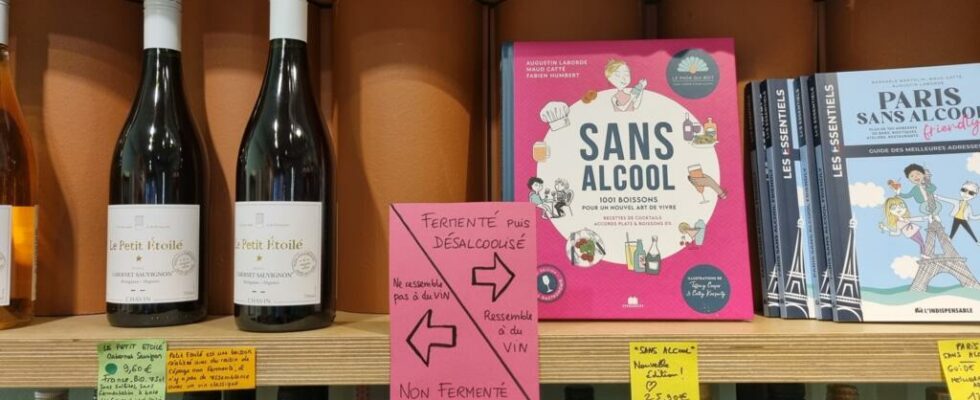Every January, it’s the return of Dry January: it’s about giving yourself a break from your alcohol consumption for around thirty days. Over the years, the challenge has become less difficult to meet, as non-alcoholic drinks tend to become a category in their own right, with substitutes for wine, beer and spirits that distinguish themselves from traditional soft drinks, which are fruit juices, nectars, syrups and other sodas.
Dealcoholized wines or spirits, infusions or macerations of medicinal plants, fermented drinks, now the alternatives to alcoholic drinks are very varied. Consumers are looking for healthier and more natural drinks, without excluding the notion of pleasure, and this demand is therefore supported by a growing supply.
THE drinking peacocka cellar located at 61, rue de Meaux, in the 19th arrondissement of Paris, is the first entirely alcohol-free cellar in France with no less than 600 references. For the record, the peacock has a special relationship with the drink, because each year, its substantial plumage falls. So, for it to grow back, it must drink constantly, and with a quality drink.
This Dry January, the Parisian cellar is offering tastings of its products. Thomas, a customer, holds his glass by the stem and swirls the wine, smells it then drinks it. We find quite confusing sensations because in fact, there is astringency and at the same time, a lot of lightness, he analyzes. So, we don’t really know what we’re juggling… Still not ready, but in any case, I think we’re clearly on the right track. »
This Merlot red wine, offered for tasting by Andréa Douillard, has a particularity: “ These are wines that are dealcoholized, she explains. We, at Moderato, use the vacuum distillation method, that is to say that in fact, we will heat the wines at low temperature in stainless steel vats under vacuum between 30 and 35 degrees, which will allow the alcohol to evaporate and end up with alcohol-free products. »
This time, it’s an alcohol-free white sparkling wine that is poured into the glasses. “ It’s good, surprising, it’s very dry, it’s very interesting, explains Philippe, a champagne lover. I stopped drinking four years ago. I always love, when there is a festive dinner, tasting each wine and then finding something completely different, original, it’s not palliative, it’s different, with another objective. »
“New drinks that will no longer try to copy alcohol »
At the head of the Le Paon qui boit cellar, there is a man, passionate and refined. Augustin Laborde explains what makes the offer original: “ You have on the one hand all the copies of alcohol without alcohol – so obviously beers, aperitifs, wines, etc. – which seek to reproduce alcohol as much as possible without alcohol, he lists. And above all, on the side, it’s this market, this demand that we support a lot and that we find very interesting: new drinks that will no longer try to copy alcohol. We’re going to step out of our alcoholic frame of reference a bit and that’s going to avoid always comparing and therefore potentially being disappointed. And these drinks have nothing to envy of really very complex drinks and are now served in starred restaurants, in very beautiful tables. »
And that’s the good idea, not to copy, but to offer something else, an alternative to alcohol. Besides, abstainers are not the first customers. “ Contrary to what one might think, the vast majority of our customers, around two thirds, are people who continue to drink alcohol, but who look for alternatives from time to time, indicates Augustin Labordethese are the ones that we will call in bad French flexi drinkers. So, there you have it, people who continue to drink alcohol, but who look for alternatives and who, when they look for alternatives, do not want to be in water, in still water or whatever, so want something complex, adult, refined, etc. »
On this tasting day, Le Paon qui boit is always full. If consumers seek the pleasure of drinking in sobriety, they also claim the health benefits of non-alcoholic drinks.
To listen in Priority healthJanuary challenge: a month without alcohol
